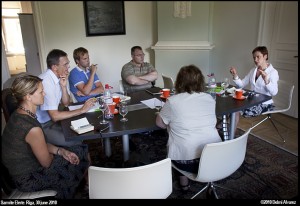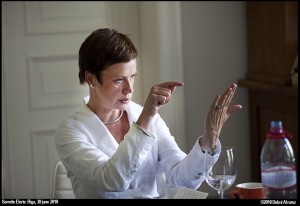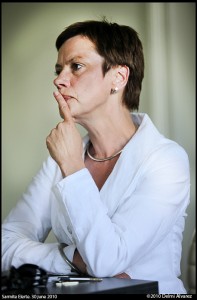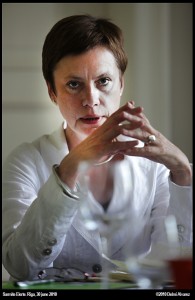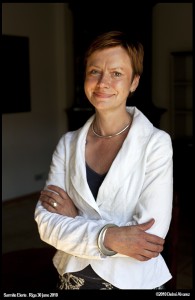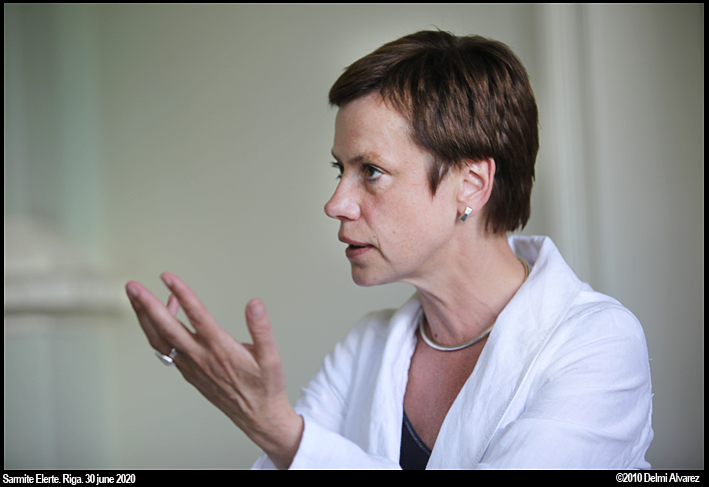
Baltic Reports photojournalist Delmi Álvarez took photos of Ēlerte this week as she works on her party's political campaign. Photo by Delmi Álvarez/Baltic Reports
RIGA — Sarmīte Ēlerte has been a public figure in Latvia for many years, but has not entered politics until now.
Ēlerte headed Diena, arguably Latvia’s most influential newspaper, since 1992, and was described by the late New York Times columnist William Safire “as the most fascinating woman in the former Soviet Union.”
While the paper was her ward, Diena was a bastion of aggressive, old school journalism that never tired at taking on a corrupt political system. Before her departure in 2008, Ēlerte spearheaded numerous investigations into and criticisms of the so-called oligarchic clique of Ainars Šlesers, Aivars Lembers, and Andris Šķēle.
The paper was instrumental in defending Alekseijs Loskutovs, at the time the embattled head of the anti-corruption bureau, and organizing the so-called “umbrella revolution” that ultimately led to the downfall of then Prime Minister Aigars Kalvitis.
Now Ēlerte along with Society for Different Politics, Prime Minister Valdis Dombrovskis’ New Era Party and Civil Union have teamed up under the Unity (Vienotība) banner and are neck-and-neck with the Harmony Center Party, headed by Riga Mayor Nils Ušakovs. Latvian voters will face stark choices about the future direction of the country in this fall’s election.
Given that she could potentially be a powerful person in the next government, Baltic Reports asked Ēlerte about the election, politics and the media in a telephone interview on Friday.
Baltic Reports: Given your experience in the Latvia media, what do you think are the biggest challenges facing the Latvian media today?
Sarmīte Ēlerte: I think that the biggest challenge is to find the right platform where quality journalism can live, and I think that the channel is not important, what’s important is the quality of journalism and I’m quite sure that people need investigative journalism, analytic journalism.
Journalism is searching for platforms but we have good examples such as Ir. This magazine was created by journalists who left from Diena … but the main issue is journalism. There are even less than 10 journalists who are able to create a very good magazine.
In terms of how sustainable they are, it’s not an easy time for media, but still they [Ir] started a magazine in very good times. It’s very attractive for readers.
I’m not involved with that project in any way because when they started I made the decision to go into politics.
BR: What do you think the media could do better to improve the accountability of public officials and large companies in Latvia?
Ēlerte: I think that the answer is more or less the same, just to do good journalism, just to have the capacity to do investigative journalism and to continue to do it. We have such journalists, and investigative stories about the big companies, like Latvenergo.
But I think we need not just journalism.
When I was in Diena, we rebuked the Riga City Council and State Chancellery because we demanded information about salaries of state officials and those who run big companies.
That was years ago [we requested the information], but one of these cases is still in court procedures.
This is only one of the reasons why I decided to go into politics. From the civil society you can demand and achieve a lot of things, but then there are cases when you can’t do more, so this should be changed from the side of politics.
BR: Do you believe the actions of Ilmārs Poikāns were justified and if so, why?
Ēlerte: You know, I believe that the result of his actions was justified for the access to information about salaries, not only salaries which have state officials, but those who run state-owned companies or municipal companies.
I talked about it before, that we tried to achieve this transparency through court cases.
He made the information available in a different way. I do not justify the way, how he achieved this, how he received the information but the result should be the basic law of good government.
In private companies, the salaries are controlled by owners. In government, society is the owner and we should be able to see not only the salaries but everything that belongs to the people, everything that’s finances are somehow dependent on the state, it should be open and transparent. There should be a transparent databases that follow everything that is going on.
And maybe just to add, with this lack of transparency we saw the results because the salaries for managers in these state-owned or municipal companies, they are absolutely absurd, there were not any comparisons with private companies.
You can see what is going on with no control, the state was not a good controller.
BR: What made you decide to enter politics?
Ēlerte: What I mentioned earlier was one of the reasons, of course. There were two other main reasons why I decided to join politics.
First, I feel growing concern about the possibility that Latvian politics will be dependent on pro-Kremlin political forces and I think that it could change the way how in all levels of Latvian development because starting from early 1990s we had really very stable ties [with the rest of Europe] and we had a very clear Western orientation.
I participated in different stages when I was in Popular Front (Tautas Fronte), when independence and Western integration were the choices of Popular Front. It was the basis of how we examined political choices when I was in Diena. I feel this course of Latvia’s could be changed.
The second [reason I joined politics] is the huge influence of state corruption, the huge influence of oligarchs in Latvian politics, and one of the results of this autumn election could be a pro-Kremlin, oligarch government of Latvia. I feel a citizen’s responsibility to do everything I can to avoid it.
Of course we can try to understand why it’s good for Russia, or good for Putin. It’s good to have their voice in the EU and NATO.
After what happened in Ukraine, I think it’s clear in Russia that it’s easier to do things with soft power than hard power like in Georgia. The results are better.
I talking about this pro-Kremlin, oligarch possible choice for Latvia — it would influence our lives in all stages. I don’t want to see in Latvia the business culture of Russian business, for example.
BR: If elected, why would Vienotība run Latvia better than Šķēle/Šlesers/Par labu Latviju or Harmony Center?
Ēlerte: There now exists this pro-Kremlin and oligarch coalition. We can see it in different parliamentary votes, so there could be very harmonious coalition [if they were elected].
Vienotība already knows what could be better than the Šķēle/Šlesers government — the government now run by Valdis Dombrovskis, who will be the candidate for prime minister for Vienotība.
He received this seat in a very hard situation but he has a clear goal, stability, that has led to good results which we can see already in the economy. Latvian exports are growing, the manufacturing industry is growing and unemployment is decreasing, well not very much but a little. There are a lot of good signs in the economy and I think it’s very important to continue.
It’s very important to have fair rules for competition. If state corruption is part of business rules there cannot be this fair competition [for public tenders]. That means the winner is not the best, but those who are closer to the ruling oligarchs.
BR: How can the culture of corruption that pervades Latvian politics be changed?
Ēlerte: You know, first of all there should be a political will to change it. I think that when the previous government, the People’s Party was ruling they never had this political will because they were part of this system, they were creators of this system.
I know that Vienotība has such a will. But of course there should be changes in some rules, how politics is operating in Latvia with the party financing system and rules on how the election campaigns should be run. There is still huge money put in these pre-election campaigns, and this money is earned somewhere, somehow.
So I’m quite sure we need to have state financing for campaigns, maybe not 100 percent but in some proportion.
There should be transparent and different rules for competing for state or municipal investments. They are not transparent enough.
As we know, we saw what happened with the children’s hospital’s state finances. There are a percentage that was not put for the health of children but stayed in the pockets of people in charge.
So mainly, these two.
If we are talking about concrete changes, than I support these two directions. We do not have any financing for political financing in Latvia for the state. We are more or less unique.
BR: Is publicly funding campaigns realistic for the near future, though, given Latvia’s budget constraints?
Ēlerte: I think that yes, because it’s not such a huge amount of money and in the end it will be much cheaper for society than to not have such state financing because I think that this system is how parties try to find finances for election campaigns, it’s part of that state corruption system because they should find this money somewhere and unfortunately a lot of parties are using their influence on state decisions to earn their money through those means.
State corruption — it doesn’t mean to steal a table or cup of coffee, it means you’re stealing decisions for his or her private needs.
BR: Has Vienotiba had a difficult finding funding?
Ēlerte: Yes, it’s been very difficult given the financial situation but at the same time, this pre-election competition will be very hard. I do not see any problems for the Šķēle/Šlesers campaign to find financing.
This article is free to view. To read Baltic Reports’ subscription-only articles, click here.

